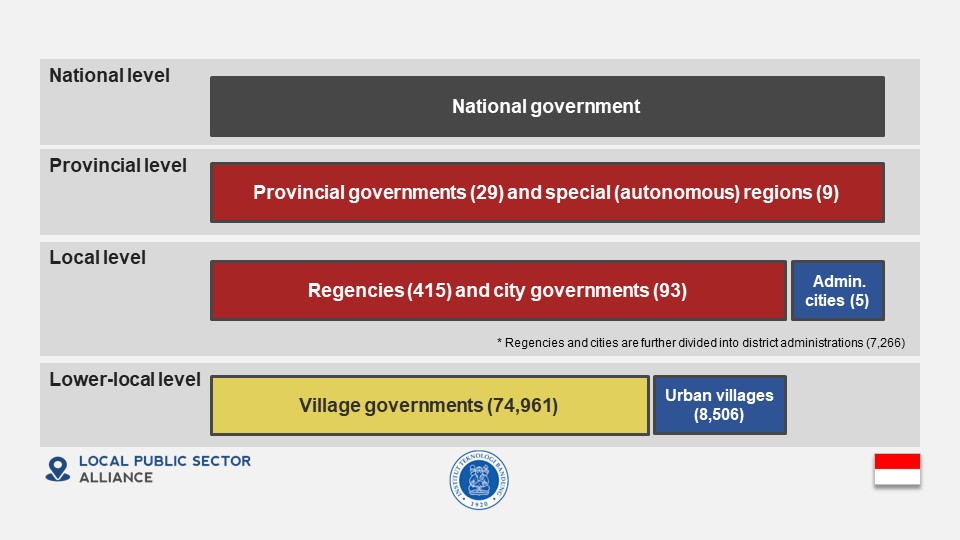
The Unitary State of the Republic of Indonesia, or The Republic of Indonesia, is the world’s largest archipelagic state that spans Southeast Asia and Oceania between the Indian and Pacific oceans. With over 270 million people, Indonesia is the world’s fourth-most populous country. Java, the most populated island, accounts more than half of the country’s population. While remaining a unitary state, most of the public sector’s functional responsibilities (or authorities) are assigned to provincial and local governments except for a number of absolute authorities reserved for the central government: foreign policy, security, defense, judiciary, monetary, and religion. Other than these national-level functions, the public services enjoyed by Indonesians are mostly provided by the provincial and local governments.
Subnational government structure
The Republic of Indonesia is a unitary state comprising five tiers of governance and administration: one central government, 38 provincial governments (including special provincial-level entities), 514 local (regency and city) governments, 7,266 district administrations, and 83,467 village-level governance institutions. At the provincial level, Indonesia has an asymmetric decentralization framework, with 9 entities being designed as special (autonomy) regions. Under the Constitution (as revised in 2000) and the legal framework, provincial and local governments have independence in terms of political, administrative, fiscal and public service provision responsibilities. Rather than forming an autonomous local government level, the local district administration tier only act as an administrative extension of the local government level. In contrast, rural village governments have a greater degree of autonomy, including rights to raise revenues, elect their own local leaders, and exercise spending authority.
Nature of subnational governance institutions
Provincial governments and local governments in Indonesia should be considered autonomous subnational governments with their own elected leadership, autonomous decision-making power and administration, and extensive functional responsibilities. Rural village governments should be considered hybrid local governance entities, while districts and urban villages are a deconcentrated part of their respective local governments.
Functional assignments
The Constitution (as revised most recently in 2000) and Law 23/2014 on local government assigns the functions and responsibilities of the central, provincial, and local governments. Even though most frontline public services are delivered by local governments (including public education, primary health services, solid waste management, and so on), some public services that have considerable externalities, that are cross-regional in nature, or that reflect national priorities, are carried out directly by the central government. For example, while the responsibility for public housing legally falls under the authority of local governments, in practice, housing for the poor is managed by the central government. The same is true for highway infrastructure, electricity provision, social protection and tertiary education. While the legal assignment of functional authority provides considerable discretion to provincial and local government, the de facto autonomy of subnational governments is not absolute: for instance, their ability to deliver public services is limited by the availability of grant resources and their limited discretion to raising subnational revenues.
LoGICA Assessment
LoGICA Intergovernmental Profile: Indonesia 2023 (PDF / Excel)
Additional resources
Indonesia Country Profile (World Observatory on Subnational Governance and Investment, OECD/UCLG)
Local government country profile: Indonesia (UN Women)
Two Decades of Fiscal Decentralization Implementation in Indonesia (Fiscal Policy Agency, Ministry of Finance, Republic of Indonesia)
Back to Local Public Sector Alliance Intergovernmental Profiles – Country Page
Last updated: September 24, 2023
